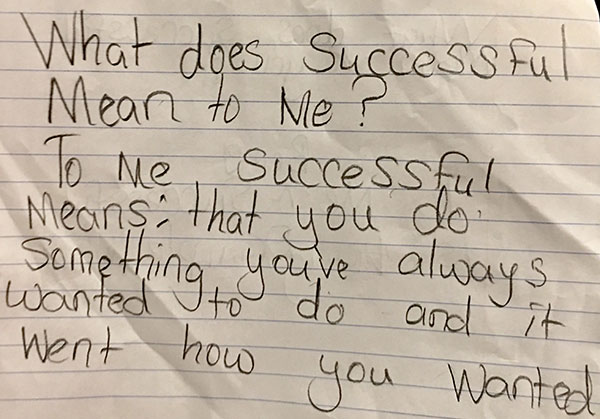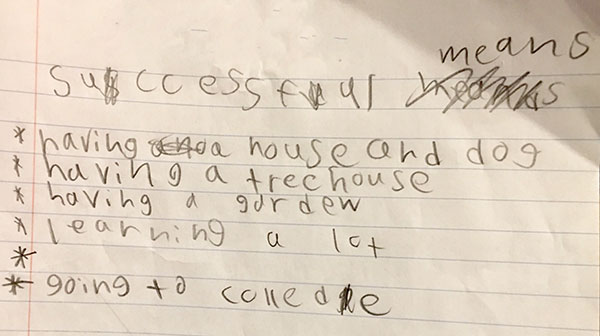
Success. Thesaurus.com offers more than fifty synonyms for the word “success”… accomplishment, fame, happiness, progress, triumph, and victory all have a place on the list. With testing hysteria making the rounds in schools and classrooms everywhere, the definition of success as it relates to reading, has likely weighed heavily on the minds and hearts of many teachers. How do we measure reading proficiency? How do we measure success? I firmly believe that it is both illusive and dangerous to decide whether a child has been successful by turning only to a score on a high-stakes reading test.
Sadly, in Minnesota, our legislators have deemed a proficient score of 350 on the third-grade reading MCA such a significant measure of success that for years our state has used it as a way to reward schools with what they call “Literacy Incentive Aid” which is explained in A Publication of the Minnesota House of Representatives Fiscal Analysis Department (p. 48):
Schools are eligible for additional aid based on how well students in the third grade read (called “Proficiency Aid”), and how much progress is being made between the third and fourth grades in reading skills (called “Growth Aid”). Proficiency aid is calculated by multiplying $530 times the average percentage of students in a school that meet or exceed proficiency over the current year and previous two years on the third-grade reading portion of the Minnesota Comprehensive Assessment, multiplied by the number of students enrolled in the third grade at the school in the previous year. Similarly, Growth aid is calculated by multiplying $530 times the percentage of students that make medium or high growth on the fourth-grade reading Minnesota Comprehensive Assessment multiplied by the previous year’s fourth grade student count. [124D.98]
Let’s think about that for a moment. Basically, this “reading bounty” that is placed on the heads of our students offers schools with fewer English Language Learner students, schools with fewer students who receive free or reduced lunch, and schools with fewer Special Education students, a hefty financial boost for every student who attains that score of 350. There seems to be little regard for the fact that students from these demographic groups already face a serious opportunity gap and that gap is a pre-existing condition that is further exasperated by this model of school funding. In other words, the rich get richer, while the poor continue to struggle.
How I wish I could convince our legislators that defining reading proficiency or success as a score of 350 on the reading MCA is simply not the only, and especially not the best, way to determine whether a diverse group of eight- and nine-year old kids are successful in terms of literacy. I am convinced that I have plenty of data in addition to the MCA score, both the “hard” and “soft” kind, that paints a better picture of whether or not my students have attained literacy success. You name it, I’ve got it. Summative, formative, formal, informal, fluency CBMs, anecdotal conference notes, running records, NWEA MAP data, essays, opinion writing, research reports, writing in response to reading … the list goes on and on. A 350 is certainly not the only way to measure literacy success in Room 212. Just as important (if not more important) are the conversations, deep-thinking, and personal reflections my students share with me and each other on a daily basis.
 As easy as it is to be discouraged and feel like I’m the one who has failed when some of my brilliant, hard-working and oh-so-wise students come up short of that measure of success, aka a 350, I need only to call up memories of a recent read-aloud moment in Room 212. The book, Front Desk, by Kelly Yang, tells the story of Mia Tang, a determined, resourceful and courageous ten-year-old who discovers the power of the written word. Mia and her parents are Chinese immigrants, working endless hours at the Calivista Motel under the scrutiny of the heartless owner, Mr. Yao in the early 1990s. Mia befriends Lupe, another immigrant in her class, whose family came to the United States from Mexico. The two girls discover they were both hiding similar secrets that were attempts to cover up the harsh realities of their lives. Once they realize they could be vulnerable with each other, they share a great deal more about their inner most thoughts and feelings. Much like my reflections and wondering about what it means to be successful, Mia shared the following:
As easy as it is to be discouraged and feel like I’m the one who has failed when some of my brilliant, hard-working and oh-so-wise students come up short of that measure of success, aka a 350, I need only to call up memories of a recent read-aloud moment in Room 212. The book, Front Desk, by Kelly Yang, tells the story of Mia Tang, a determined, resourceful and courageous ten-year-old who discovers the power of the written word. Mia and her parents are Chinese immigrants, working endless hours at the Calivista Motel under the scrutiny of the heartless owner, Mr. Yao in the early 1990s. Mia befriends Lupe, another immigrant in her class, whose family came to the United States from Mexico. The two girls discover they were both hiding similar secrets that were attempts to cover up the harsh realities of their lives. Once they realize they could be vulnerable with each other, they share a great deal more about their inner most thoughts and feelings. Much like my reflections and wondering about what it means to be successful, Mia shared the following:
I was curious what Lupe thought of as “successful.” Everybody seemed to have different criteria. I used to think being successful meant having enough to eat…
When I asked Lupe, she put two fingers to her chin and thought real hard. “I think being successful in this country means having a living room without a bed in it,” she decided.
After reading that excerpt to my incredible kids, we dug deeper into the conversation and opinions shared by Mia and Lupe. There was a consensus that Mia was right about people having very different ideas about what it might mean to be successful. Some kids shared their definition and others were very quiet. I invited the class to think more about the topic of being successful and to consider writing about what it means to them. A number of kids accepted the invitation.
If only that “Literacy Incentive Aid” could include criteria beyond an MCA test score of 350. I would like to believe that the thoughtful reflections shared by my students would convince our legislators that proficiency is more than a number derived from a bunch of correct answers to multiple-choice questions about reading passages students may have little interest in reading.
Two of my favorite student responses:


After all, isn’t being a successful reader as much about what reading does to our heart as it is about what reading does to our head? I doubt there will ever be a standardized test that can adequately measure the impact of reading on one’s heart. However, if there were such a thing, there is no doubt that all of my students would surpass a 350.
